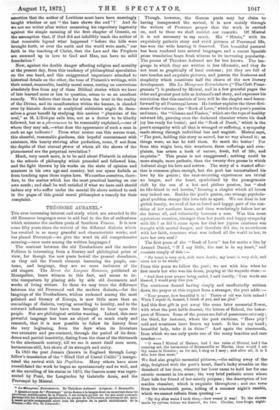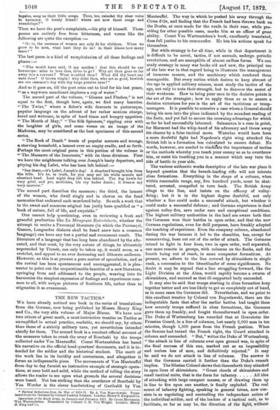THEODORE AIIBANEL.* THE ever-increasing interest and study which are awarded
to the old Romance languages seem to add fuel to the fire of enthusiasm which animates the modern poets of Southern France. It is now some fifty years since the revival of the different dialects which has resulted in so many graceful and characteristic works, and has placed Provencal—we give the word its old comprehensive meaning—once more among the written languages.f
The contrast between the old Troubadours and the modern Felibres is interesting from a literary and philological point of view, for though the new poets bewail the present decadence, as they call the French element leavening the people, cus- toms, and language, they are no mere imitators of the
old singers. The Revue des Langues Romanes, published at
Montpellier, bears witness to this fact, and seems to in- vite comparison by placing side by side old documents and works of living writers. In these we may trace the difference between the old Provencal and the modern dialects,—f or the language of the Troubadours, whilom reckoned among the most polished and literary of Europe, is now little more than an assemblage of dialects, varying according to locality, and to the outward influences that have been brought to bear upon the people. Nor are philological articles wanting. Indeed, this once powerful language has been an object of so much study and research, that it is now possible to follow its history from
the very beg-inning, from the days when its literature was extensive and pre-eminent, through the period of its deca- dence and partial inactivity, dating from the close of the thirteenth to the nineteenth century, till we see it assert itself once more, harmonious-still, but shorn of its strength and unity.
In 1825 the poet Jasmin (known in England through Long- fellow's translation of the "Blind Girl of Castel Cuillie") inaugu-
rated the revival with his Papillotos. Many others have since consolidated the work he began so spontaneously and so well, and at the unveiling of his statue in 1870, the Gascon muse was repre- sented by Pozzi, the Languedoc by Gabrielle Azais, and the Provencal by Mistral.
* La Miougrano Ent, eduberto. By Thdodore Aubanel. Avignon: 5. Itomanille. t Quant au nom de" Provençal" ga'on donna S is league dont on se servait dans lee provinces mdridionales de Is France, II est certain go'elle no fat pas Masi nommde parcegn'elle fat d'abord particuliare an penple de is Provence, proprorneat dit, male a came gu'elle comprenait More tons les peoples de is partie mdridionale de is France.-llis. Gen. do Languedoc. Though, however, the Gascon poets may lay claim to having inaugurated the revival, it is now mainly through the writers of Provence proper that the work is carried on, and to these we shall restrict our remarks. Of Mistral it is not necessary to say much. His " Mireio," with its exquisitely pathetic story and vivid pictures of Provencal life, has won the wide hearing it deserved. This beautiful pastoral has been rendered into several languages, and a recent Spanish prose translation bears fresh witness to its increasing popularity The poems of Theodore Aubanel are far less known. The lan- guage in which they are written is less idiomatic, and they do. not treat so graphically of local customs ; yet they are full of rare touches and exquisite pictures, and possess the freshness and simplicity which constitute half the charm of the new literary development. His La Miougrano Entreduberto ("The Cleft Pome- granate ") is prefaced by Mistral, and in a few graceful pages the- older and greater poet tells us Anbanel's sad story, and expresses his conviction that this canticle of love will be the chaplet used hence- forward by all Provencal lovers. He further explains the three divi- sions of the volume; the "Book of Love," which is the poet's passion and tears; the "Gleams and Flashes," which are the rays of healthy outward life, piercing even the darkened chamber where his dead joy lies ready for burial; and the "Book of Death," which is the poet's sympathy with all that is wronged or suffering, -a sympathy made strong through individual loss and anguish. Mistral says,. "The poet, holding this story as sacred, has no way altered it ; as. things were, so has he told them. So much the better I For from this virgin love, this weariness, these sufferings and com- plaints, has arisen a book of nature, fresh, full of life, and exquisite." This praise is not exaggerated ; nothing could be more simple, more pathetic, than the twenty-five poems in which Aubanel sings his love and sorrow. The story of a wasted affec- tion is common-place enough, but the poet has immortalised his. loveby his genius ; the ever-recurring experiences are trivial no longer, and the heart, symbolised by the pomegranate cleft by the sun of a hot and pitiless passion, has "shed its life-blood in red berries," forming a chaplet which all lovers- may indeed use. Besides the poet's genius, one strange psycholo- gical problem stamps this love-tale as apart. We see Zani in her girlish beauty, we read of her as loved and happy, part of the sun- shine of her southern home, and then wonderingly follow her as- she leaves all, and voluntarily becomes a nun. Was this some mysterious vocation, stronger than her youth and happy sympathy with life ? or did it come upon her that her joyous existence was fraught with mortal danger, and therefore did she, in accordance with her faith, renounce what was indeed all the world to her, to save her own soul ?
The first poem of the "Book of Love" has for motto a line by Arnaud Daniel, "if I say little, the rest is in my heart," and consists simply of this :— " My heart is very sick, sick unto death; my heart is very sick, and cares not to be whole."
From this poem we follow the poet ; we are with him when he- first meets her who was his doom, praying at the wayside cross :— "And then your prayer being ended, I said timidly, Your words are' blessed, I would pray like you.'"
The courteous damsel having simply and unaffectedly written down the prayer at this request from a stranger, the poet adds
Your prayer, how beautiful it is ! Theirs of old was faith indeed ! When I repeat it, damsel, I think of you, and am glad."
And this first gift is put away like some later memorial flower,. with what the poet holds dearest, the letters of Reboul, the baker- poet of Nismes. Some of the poems are full of passionate entreaty ; the third, for instance, where the poet exclaims, " Have pity cold and weariness have frozen my heart. It lies in my hand ; beautiful lady, take it in thine !" And again the nineteenth, from which we can only quote one of the many beauties and rare touches :—
" 0 were I Mistral of Malan°, had I the voice of Mistral, had I the cunning art, the harmonies of Ronmanille or Martin, then would I set. thy name in litanies ; as for me, I sing as I may ; and after all, it is I who love thee most."
We find also graphic memorial pictures,—the sailing away of the freighted with the poet's heart, Zani's lucky stumble on the threshold of her door, whereby her lover came to hold her for one extatic moment in his arms ; the very brief pathetic scene where- Zani tells her friend of her saintly purpose ; the description of her maiden chamber, which is exquisite throughout ; and one verse from the nineteenth poem, telling of a summer night's ramble, which we cannot refrain from quoting :— "By thy slim waist I took thee,—how sweet it was! To the chorus made by sylvan voices we danced, we two. Cicalas, tree-frogs, night-
Juggles, sang us their little songs. Thou, too, raisedst thy clear voice in harmony. 0 lovely friend! where are now those songs and roundelays?"
Then we have the poet's complaints,—his pity of himself. These poems are entirely free from bitterness, and verses like the following are quite the exception G to, the caresses of women are only fit for children. When we grow to be men, what hurt they do us! in their kisses how many tears!"
The last poem is a kind of recapitulation of all these feelings and phases :—
" Who would have said, 0 my maiden ! that this should be our 'horoscope: mine to love thee, thine to go ? Why art then gone so far -away into a convent ? What troubled thee ? What did thy heart say .unto thee? 0 brown virgin ! why didet thou, who art so good, bewitch me one summer's day with thy large pensive eyes?"
And so it goes on, till the poet cries out to God for his lost peace, 4' as a wayworn mendicant implores a cup of water."
The second part of the volume, "Gleams and Flashes," is not .equal to the first, though here, again, we find many beauties. "The Twins," where a fisher's wife descants in picturesque, popular language on the advent of her rather anxious charge, loved and welcome, in spite of hard times and hungry appetites. "The Month of May," "The Silk Spinners," rippling over with the laughter of girls, and some verses on an image of the Madonna, may be considered as the best specimens of this second -series.
"The Book of Death" treats of popular sorrows and wrongs, a starving household, a lament over an empty cradle, and so forth. Perhaps the most original poem in this portion of the volume is 4' The Massacre of the Innocents," with its three divisions. First we have the neighbours talking over Joseph's hasty departure, and pitying his dog Labri, who has been left behind :- "See there,—it's Lahr!, Joseph's dog! A shepherd brought him from the hills. It's he, in truth, for you may see his white muzzle and chestnut bead. Last night they left him behind. The dog bowls for -very grief, and yet, methinks, his cry bodes death ; it freezes my -very marrow."
'The second part describes the massacre; the third, the lament of the women, who dwell singly and in chorus on the fond memories that endeared each murdered baby. So ends a work that in the sweet and sonorous original has justly been qualified as "a book of nature, full of life, and exquisite."
One cannot help questioning, even in reviewing a fresh and graceful production like La Miougrqno Entreduberto, whether the attempt to revive a Provencal literature (in which the Provencal, 'Gascon, Languedoc dialects shall be fused anew into a common language) can have any but a partial and evanescent result. The literature of a language that has long been abandoned by the edu- cated, and that must, by the very nature of things, be ultimately superseded by French, can only be taken up, it would seem, as a crotchet, and appeal to an ever decreasing and illiterate audience. However, as this is at present a pure matter of speculation, and as the revival has been spontaneous and unexaggerated, it is plea- santer to point out the unquestionable beauties of a new literature, springing from and addressed to the people, weaving into its 'harmonies the simplest expression of feelings and experiences com- mon to all, with unique pictures of Southern life, rather than to stigmatise it as evanescent.



































 Previous page
Previous page